
If you own rental property in California and are considering selling it, you may be concerned about the tax implications. Selling property can often result in capital gains taxes, which can eat into your profits. However, there are strategies you can employ to sell your rental property without paying taxes. I
What Is a Capital Gains Tax?
Before diving into the strategies, it’s important to understand what a capital gains tax is. In simple terms, a capital gains tax is a tax imposed on the profit made from selling an asset, such as real estate.
In California, capital gains tax rates vary depending on your income and the length of time you held the property. Short-term capital gains tax is applied to properties owned for one year or less, while long-term capital gains tax applies to properties owned for more than one year.
What Is the Difference Between Short and Long-Term Capital Gains Tax?
Short-term capital gains tax is typically higher than long-term capital gains tax. It is taxed at your ordinary income tax rate, which means it can range from 10% to 37% depending on your tax bracket. On the other hand, long-term capital gains tax rates are generally lower, capped at 20% for high-income individuals. Understanding the difference between these two types of capital gains tax is essential when considering strategies to minimize your tax liabilities.
Short-Term Capital Gains Tax
When selling a rental property that you have owned for one year or less, any profits will be subject to short-term capital gains tax. This means that you will be taxed at your ordinary income tax rate, which can be significantly higher than long-term capital gains tax rates. To minimize your tax liabilities, explore alternative strategies such as tax exemptions and deductions.
Long-Term Capital Gains Tax
If you have owned your rental property for more than one year, you may be eligible for long-term capital gains tax rates. These rates are generally lower than short-term capital gains tax rates, providing an opportunity to reduce your tax burden.
By utilizing specific strategies, such as a 1031 exchange or converting the property into your primary residence, you can potentially defer or eliminate paying capital gains taxes altogether.
Tax Exemptions and Deductions
When selling your rental property, there are various tax exemptions and deductions available that can help reduce your taxable income.
-
- Residence exclusions: If you have lived in the property as your primary residence for at least two out of the past five years, you may be able to exclude up to $250,000 of capital gains if you’re single or up to $500,000 if you’re married and filing jointly.
- Depreciation deduction: Over time, rental properties can be depreciated, allowing you to deduct a portion of its value each year. This can help offset your taxable income when selling the property. It’s crucial to consult with a tax professional to ensure you’re taking advantage of all available exemptions and deductions.
1031 Exchange: A Key Strategy
One of the most popular strategies utilized by real estate investors to defer paying capital gains tax on rental property is a 1031 exchange. A 1031 exchange allows you to sell your rental property and reinvest the proceeds into a similar property without recognizing the capital gains. By doing so, you can effectively defer the tax liability until you sell the replacement property.
To execute a 1031 exchange, you must follow specific guidelines and meet certain requirements.
- First, you must identify the replacement property within 45 days of selling your original rental property.
- Then, you have 180 days to complete the purchase of the replacement property.
Converting Rental Property into a Primary Residence
Another strategy to consider when trying to sell rental property without paying taxes is to convert it into your primary residence. By living in the property for at least two years, you may be eligible for the primary residence exclusion mentioned earlier. This strategy allows you to take advantage of the tax benefits associated with selling a primary residence, such as the exclusion of up to $250,000 or $500,000 of capital gains.
There are specific IRS rules and occupancy requirements when converting a rental property into a primary residence. You must genuinely intend to make the property your primary residence and meet the minimum occupancy requirements. Understanding the potential tax benefits and the rules associated with this strategy is crucial to ensure you’re making informed decisions.
Offsetting Gains with Losses
Tax-loss harvesting is another strategy that can help offset capital gains when selling a rental property. By strategically selling other investments that have declined in value, you can generate capital losses that can be used to offset your capital gains. This can help reduce your overall taxable income and potentially lower your tax liabilities.
Timing is essential when utilizing tax-loss harvesting. It’s important to sell the investments at a loss within the same tax year as the sale of your rental property. Additionally, there are rules and limitations on the amount of losses that can be deducted in a given year.
Utilizing Installment Sales
An installment sale is another strategy that can help spread out capital gains and potentially reduce your tax liability. With an installment sale, you sell your rental property and receive the proceeds in installments over a period of time, rather than in a lump sum. By doing so, you can spread out the recognition of the capital gains, which may result in a lower overall tax liability.
It’s important to follow the IRS guidelines when executing an installment sale to ensure compliance. The structure of the sale and the timing of the installments must meet specific criteria outlined by the IRS. Consulting with a tax professional or real estate attorney can help you navigate this strategy and maximize its tax benefits.
Retirement Accounts and Real Estate Investments
Using retirement accounts, such as self-directed IRAs, for real estate investments can have significant tax implications. While utilizing retirement accounts for real estate investments can offer various advantages, it’s essential to understand the tax consequences. Contributions to traditional IRAs are typically tax-deductible, but withdrawals during retirement are subject to ordinary income tax rates.
On the other hand, contributions to Roth IRAs are made with after-tax dollars, but qualified withdrawals in retirement are tax-free. By strategically utilizing retirement accounts for real estate investments, you can potentially defer or eliminate capital gains taxes. However, consult a financial advisor or tax professional to understand the specific rules and regulations surrounding this strategy.
Charitable Remainder Trusts (CRT)
A charitable remainder trust (CRT) is a strategy that can be used to sell rental property and reduce taxes while supporting a charitable cause. With a CRT, you transfer your rental property to the trust, which then sells the property and invests the proceeds. You receive regular income from the trust for a specific period, typically your lifetime or a set number of years. At the end of the trust term, the remaining assets are donated to a charitable organization.
By utilizing a CRT, you can potentially reduce your tax liabilities by receiving an immediate charitable deduction for a portion of the property’s value. Additionally, you can defer capital gains taxes until you receive income from the trust. This strategy allows you to support a charitable cause while minimizing your tax burden.
Legal and Regulatory Considerations
When selling a rental property in California without paying taxes, it’s crucial to consider the legal and regulatory aspects. California has specific laws and regulations that govern property sales and tax liabilities. Staying informed about these laws and any recent changes is essential to ensure compliance and avoid any potential penalties.
Working with a real estate attorney or tax professional can help you navigate these legal considerations effectively. They can provide guidance on the specific requirements and regulations that apply to your situation, ensuring a smooth and legally compliant property sale.
Sell Your House Fast in Sacramento, California
If you need to sell your house fast but don’t want the hassle of a traditional home sale, contact Buy My House As-Is. We buy houses as-is. No repairs are needed. Avoid closing costs and realtor commissions. Close in as little as seven days. Call 916-841-5555 for a fast cash offer from our local home buyers in California.
